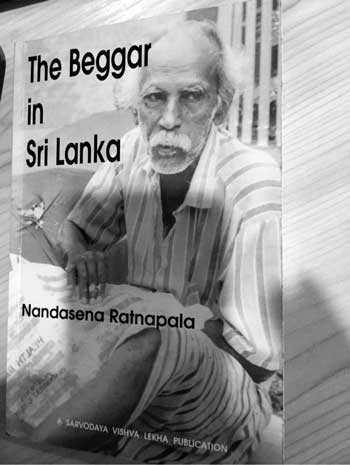Saturday Feb 14, 2026
Saturday Feb 14, 2026
Saturday, 17 November 2018 00:00 - - {{hitsCtrl.values.hits}}
 Glancing through the collection in my library, I came across a book I read with great interest about 20 years back. I knew the author – a simple, unassuming individual who never boasted about his educational and professional achievements. The subject matter of the book is rather unusual. Above all, it is an authentic story of what the author experienced himself.
Glancing through the collection in my library, I came across a book I read with great interest about 20 years back. I knew the author – a simple, unassuming individual who never boasted about his educational and professional achievements. The subject matter of the book is rather unusual. Above all, it is an authentic story of what the author experienced himself.
To refresh my memory, I picked ‘The Beggar in Sri Lanka’ which relates the experiences of Professor Nandasena Ratnapala (NR), who was in the streets as a beggar for several months. He ‘became the beggar’ when he was Professor of Sociology and Anthropology at the Sri Jayawardenapura University.
Quite apart from his findings, NR’s reaction when he met friends and relations itself is fascinating.
In his Preface, NR discusses a few ‘near misses’ during his adventure. One is how when he was begging at Maharagama, his mother – a retired school-teacher – having come to the post office to collect her monthly pension, gave him some coins in sympathy.
“She little thought that this beggar was her own son! At that moment I felt like crying out loud and telling her who the ‘beggar’ really was. As long as she lived she did not believe it, and laughed off the entire episode by calling it ‘one of my jokes’.”
On another occasion, he had gone to the University where he was teaching. His students saw him and gave him some money out of sympathy. They did not recognise him.
“Even my own colleagues having seen me, never suspected that I was the dirty beggar seated at the entrance. But a dog which I fed together with my friend, the late Professor T.B. Kangaharachchi, came and sat by my side, affectionately wagging its tail. Professor K saw the dog seated by me, flashed an inquiring look, but went away without identifying me. I immediately left the campus.”
At the gate he had met a close friend – a reputed bookseller, a sympathetic man by nature. He had given him a packet of rice without recognising him.
NR had slept at the Fort Railway Station where hundreds of beggars slept in the open space. He relates how one night at about 2 a.m. the fire brigade came and aimed water cannons at them. While the beggars – young and old, men, women, children – ran away, he enjoyed the ‘water bath’ and waited until morning in wet clothes. It had its repercussions when he started suffering from chronic bronchitis a few years later as a result of repeatedly getting wet and remaining with wet clothes for a considerable length of time.
There was at least one friend – his contemporary at Peradeniya campus, Amaradasa Gunawardeana – to whom he revealed himself when begging near his office. “When I met him, I called him ‘Amare’. He looked at me with surprise. I told him who I was.”
‘The Beggar Story’ was a sell out when he launched it in 1976. He had several editions and what I have is the 1999 edition in which he had revised the text. By then he has had more freedom in adjusting the copy because some of the characters had died and he was at liberty to write about them.
In what he calls “the greatest surprise”, he writes about a female who had read his book, had told him at an international seminar that she “understands beggars now, and since then I do not support them”. He was shocked and had felt miserable.
 “My book was written in order to make others understand the beggars and sympathise with them. It is this understanding and sympathy that could lead to a reasonable solution of this social problem. My purpose was never directed against supporting all beggars. I myself help them even today, because the majority of them deserve our support. In supporting them, we in a way at least prevent anti-social elements from being born,” he stresses.
“My book was written in order to make others understand the beggars and sympathise with them. It is this understanding and sympathy that could lead to a reasonable solution of this social problem. My purpose was never directed against supporting all beggars. I myself help them even today, because the majority of them deserve our support. In supporting them, we in a way at least prevent anti-social elements from being born,” he stresses.
The book was received well, not only in Sri Lanka but in several other countries. Professor Ratnapala’s findings are a separate story – to be related another day.
Pity we lost a researcher early in life who would have done much more studies had he lived.